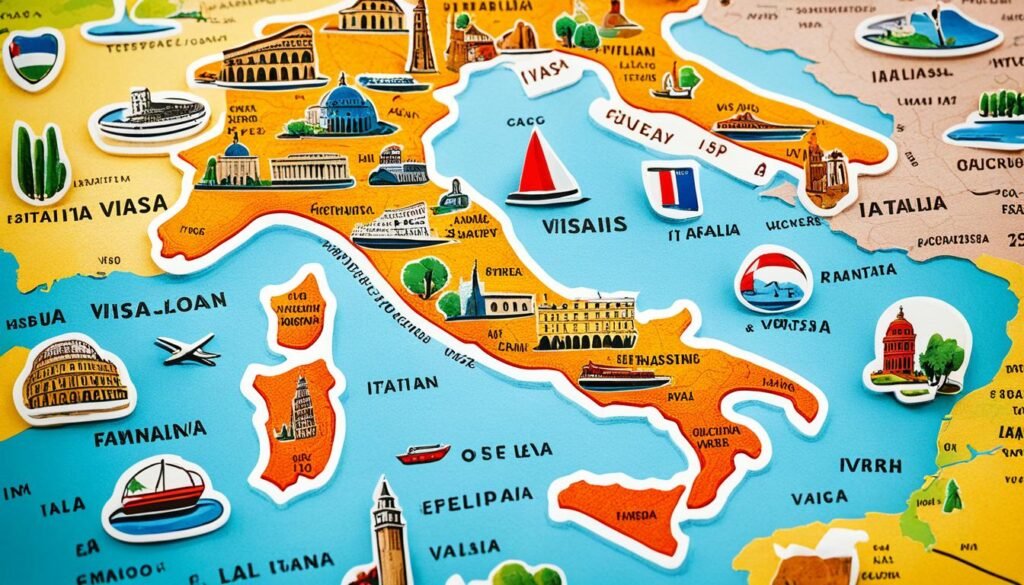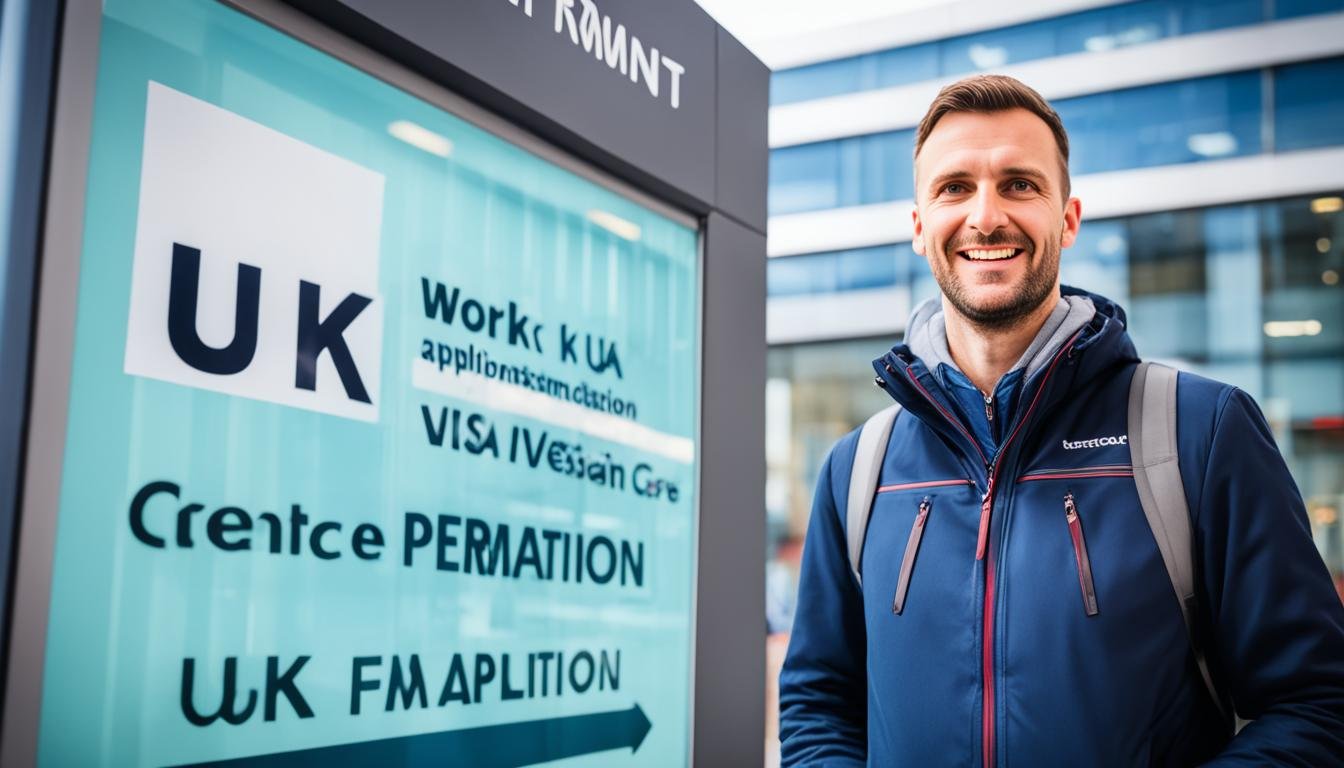Considering working in Italy as a foreigner? You’ll need the Italy work visa. It allows you to enter and search for a job. Remember, the work visa alone is not enough. You must also get a residence permit to legally work and stay in Italy.
This guide covers everything you need to know about the Italy work visa. We will go over who can apply, how to apply, and what to do once you’re in Italy. It’s useful whether you are a skilled worker, a self-employed professional, or looking for a temporary job. Let’s dive into the Italian work visa details.
Key Takeaways
- The Italy work visa is a type of Italian Long-Stay visa that grants foreign nationals permission to enter the country and seek employment.
- Applicants must meet various eligibility requirements, including having a job offer and obtaining a work permit (Nulla Osta) from their employer.
- The work visa application process involves both the employer and the employee, with specific documents required for each party.
- After entering Italy, the employee must apply for a Permesso di Soggiorno (residence permit) within 8 days to legally stay and work in the country.
- Italy offers different types of work visas, including visas for skilled workers, self-employed individuals, and seasonal or temporary workers.
Introduction to the Italy Work Visa
The Italy work visa is key for those from other countries wanting to work and live in Italy. It allows entry but requires a residence permit to stay and work legally.
Understanding the Italy Long-Stay Visa
This visa lets someone stay in Italy for up to two years. If you have a job offer or want to start a business, you need this. After arriving, you must also get a residence permit.
The Purpose of an Italy Work Visa
This visa helps foreigners work and live in Italy legally. It’s necessary for anyone working there, including those on short or long-term jobs or working for themselves. With it, they can enrich Italy’s work economy.
Eligibility Requirements for Italy Work Visas
Want to get an Italy work visa? You need to follow some rules. The Italian government looks at work permit applications during set times. These times might be every one or two years, based on the job market and immigration needs. This is part of the
Decreto Flussi and Quota System
. It decides how many work permits Italy will give out each year.
The Decreto Flussi, or “flow decree,” is key if you want to work in Italy. It controls how many work permits are given. The idea is to match these permits with what Italy’s job market needs. This way, Italy can stick to fair labor immigration rules.
Employer Sponsorship and Work Permit (Nulla Osta)
If you’re after an Italy work visa for a short term, a season, or self-employed reasons, you must line up a job. Your boss has to offer you a job and help get a work permit called a Nulla Osta. This permit shows the job fits Italy’s work rules.
The Nulla Osta is really important. It shows your employer is behind you and the job is on the level. Without a valid Nulla Osta, your visa application won’t go through.
Italy Work Visa Application Process
The Italy work visa process is a series of steps. Both the employer and the employee have important tasks. Knowing these steps well can make the process easier.
Employer’s Role in Obtaining a Work Permit
The employer starts by getting a work permit, called a Nulla Osta. This shows the job is open to a foreign worker. It states the job is not available to an Italian or EU citizen. The employer sends in the Nulla Osta application. It includes job, company, and employee info.
Employee’s Role in Applying for a Work Visa
With the Nulla Osta, the employee can apply for the Italy work visa. They do this at the Italian embassy or consulate in their home country. The employee shows they qualify for the Italy job visa. They must have a valid job contract.
Required Documents for the Work Visa Application
For an Italy work visa application, there are some key documents needed. These might change based on the visa and the person’s situation. Common documents are:
- A valid passport with at least six months of remaining validity
- A completed visa application form
- Proof of employment, such as a job offer or work contract
- The employer’s Nulla Osta (work permit)
- Evidence of sufficient financial resources to support oneself in Italy
- Police clearance certificates
- Medical insurance coverage
- Photographs that meet the Italian visa requirements
The Italy work visa process might take weeks or months. So, starting early is key.
Obtaining a Residence Permit (Permesso di Soggiorno)
When someone enters Italy with a work visa, they need to get a Permesso di Soggiorno within 8 days. This is important for legal stay and work in Italy. The Permesso di Soggiorno shows that someone is in Italy legally and allows them to live there.
Applying for a Residence Permit After Arrival
Getting a Permesso di Soggiorno has a few steps. Usually, the employer helps with the first application. Then, the employee needs to set up an appointment at the local police station. This is to finish applying and show some documents.
Documents Needed for the Residence Permit
To get a Permesso di Soggiorno, you’ll need your passport, a work contract, and health insurance. You might also need to show where you’ll live and that you have enough money. The exact paperwork changes based on your job visa and the laws.
Getting a Permesso di Soggiorno is very important if you want to work in Italy. It ensures you have the right papers to live and work there legally. With it, you get to enjoy working in Italy as a foreigner.
Validity and Renewal of Italy Work Visas
Italy’s work visas are key for working there. They usually last as long as the job contract, up to two years. But, the cool part is you can renew them for up to five years. This way, people from other countries can stay and work in Italy longer.
To renew, certain steps must be taken. The first is for the employer to get a Nulla Osta – a new work permit. After that, the employee can apply for another Italian work visa in their own country’s Italian embassy or consulate. This keeps things legal for those who want to stay and work in Italy more than their initial visa allows.
The renewal rules might be a bit different from when you first applied. Make sure to check the latest information. And, gather all the papers needed to smoothly renew your visa for Italy.
| Visa Validity | Renewal Options |
|---|---|
| Typically up to 2 years, based on the work contract | Visas can be renewed for up to 5 years |
| Employer must apply for new Nulla Osta work permit | Employee applies for new work visa at Italian embassy/consulate |
| Renewal requirements may differ from initial application | Carefully review latest guidelines and submit all necessary documents |
italy work visa for EU and Non-EU Nationals
Getting an Italy work visa is different for EU and non-EU people. EU folks can work in Italy easily. They don’t need a work permit or visa because of EU rules. They enjoy working rights and protections just like Italians.
EU Citizens’ Right to Work in Italy
If you’re from EU countries like Germany or France, it’s easy to work in Italy. You just need to let the local authorities know and get a residence certificate within 90 days.
Non-EU Citizens’ Requirements for Work Visas
But, for non-EU people from places like the United States, working in Italy needs more steps. First, you get a work permit (Nulla Osta) from your Italian employer. Then you apply for a work visa at the Italian embassy back home.
Non-EU folks have to follow Italy’s work laws. They need a job offer and might have to meet educational or skill levels. Plus, providing certain documents is a must.
Italy Work Visa for Skilled Workers and Blue Card
Highly qualified foreign professionals can use the EU Blue Card to work in Italy. It aims to bring skilled workers and top-tier talent to boost Italy’s economy.
Eligibility Criteria for the EU Blue Card
To get the Italy EU Blue Card, you must meet specific requirements. You need a job offer in Italy and a salary higher than the country’s average. You also must have a university degree or professional experience in your field.
You start by getting a work permit request (Nulla Osta) from your employer. Then, apply for the visa at an Italian embassy or consulate. If you’re successful, you can stay for up to four years, with possible renewals.
Benefits of the EU Blue Card
The EU Blue Card comes with perks for skilled workers in Italy. You can apply for a permanent residence permit after two years. This makes your life easier. Plus, it includes benefits for health, education, and bringing your family to Italy.
The Italy EU Blue Card is a great choice for italy skilled worker visas, italy employment visas, and italy job visas. It’s perfect for anyone looking for italy foreign worker visas and italy expat employment.

Self-Employment and Entrepreneurial Work Visas
Italy encourages a growing business scene and offers work visas for those who want to be self-employed or start a business there. These visas support various people like freelancers, business starters, and startup owners.
Requirements for Self-Employment Visashttps://getjobsi.com/dubai-visit-visa-fee/
The italy self-employment visas suit those who want to work alone or have their own business in Italy. To qualify, you must show a solid business plan and have the money to back your venture. You also need the skills, qualifications, and experience for your business idea.
Business Owner and Startup Visas
Italy also has visas for those starting or growing a business. These italy job visas ask for a strong business plan, proof of a big investment, and a plan to hire Italians. They support many creative ideas and businesses.

Seasonal and Temporary Work Visas in Italy
Italy has more than just the usual work visa. It also has visas for temporary and seasonal work. These unique visas are for jobs in agriculture and tourism.
Agriculture and Tourism-Related Seasonal Work
Italy depends a lot on farming and tourism. Jobs in these areas change with the seasons. So, Italy has made special visas just for seasonal work.
These seasonal visas last for up to 9 months. They help the agriculture and hospitality industries find workers when they need them most. Foreign workers can come to Italy for jobs during busy times like harvests or the summer rush.
Working Holiday Visas for Young Professionals
Italy’s Working Holiday Scheme is for young adults aged 18 to 30. It lets them work and travel in Italy for a year. This visa is a great way for young people to see Italy and learn about its culture.
Through this scheme, young professionals can take on all kinds of jobs. This includes work in restaurants, shops, farms, or the arts. It’s a way to experience different aspects of Italy’s working life.
| Visa Type | Duration | Eligible Sectors | Key Requirements |
|---|---|---|---|
| Italy Seasonal Worker Visa | Up to 9 months | Agriculture, Hospitality | Job offer, Employer sponsorship, Maximum stay of 9 months |
| Italy Working Holiday Visa | Up to 12 months | Various temporary jobs | Age 18-30, Proof of funds, Health insurance, No prior work experience required |
Costs and Fees Associated with Italy Work Visas
Getting an italy work visa and a residence permit is not cheap. You’ll need to pay for several things. These include the application fees, the cost for a visa’s revenue stamp, and the charges for a permit.
Also, you might have to pay for medical tests and police checks. These are needed for your italy work visa. Make sure to think about these extra costs in your Italy move budget.
Remember, costs and fees for italy work visas and residence permits can change. Always check for the most recent details from your country’s Italian embassy or consulate.
Conclusion
Getting an Italy work visa might seem hard, but it’s a must for those who want to work and live there. You need a job offer, a work permit from your employer, and you apply for the Italy job visa at the Italian embassy.
Italian work permits and Italy employment visas aim to bring skilled people to help Italy’s economy. By understanding the rules, foreign workers can enjoy Italy’s culture and many job opportunities.
If you’re a skilled worker, a young professional, or an entrepreneur, the Italy work visa is your start to a great time in Italy. Being ready and not giving up helps you start working there. This opens the door to all Italy can offer you.








I like this website very much, Its a rattling nice post to read and receive information. “You can never learn less, you can only learn more.” by Richard Buckminster Fuller.
What month is your favourite?
sugar defender official website Including Sugar Protector
right into my daily program has been a game-changer for my general health.
As somebody that already focuses on healthy and balanced consuming,
Sugar Defender Reviews this supplement has actually provided an added boost of
defense. in my energy degrees, and my wish for harmful snacks so easy can have such
an extensive effect on my every day life.
Sugar Defender Finding
Sugar Protector has been a game-changer for me, as I’ve constantly been vigilant regarding handling my blood glucose degrees.
I now really feel equipped and certain in my ability to keep healthy
and balanced levels, and my most recent checkup have actually reflected this
development. Having a reliable supplement to match my a massive source of comfort, and I’m truly appreciative for the
substantial difference Sugar Defender has made in my overall well-being.
Sugar Defender Ingredients